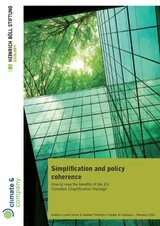Simplification and policy coherence
The goals of the European Green Deal are currently facing the risk of dilution under the EU’s new competitiveness and simplification agenda. In light of the European Commission Work Programme 2025 and the announced EU Omnibus Simplification Package, this e-paper argues that policy coherence can ensure simplification without compromising environmental and social standards. An Omnibus Simplification Package should be used as an opportunity to transform the EU’s legislative framework into an enabling toolbox for businesses transitioning toward competitive sustainability.
Authored by Louise Simon and Raphael Tietmeyer (Climate & Company) and commissioned by the Heinrich-Böll-Stiftung European Union, this e-paper offers evidence-based recommendations to support EU policy-makers in leveraging the proposed EU Omnibus Simplification Package as a tool for impactful and streamlined sustainability measures. By developing, for example, one set of unified sector guidelines to align disclosure and due diligence requirements with consistent implementation timelines, the EU would enhance these measures’ usability and effectiveness.
The e-paper conveys 3 key messages:
- The European Commission's Omnibus Package must not turn into a deregulation-drive. This would hurt European industry by creating legal and financing uncertainty. Companies have already put time and resources into collecting data and complying with disclosure and due diligence requirements. Delays and significant changes would undermine these efforts and increase costs.
- Simplification does not require complex legislative changes. Rules and legislation can be streamlined through fast-track procedures, such as supporting documents on coherence and implementing guidelines. Level 1 amendments are unnecessary – they would lead to a long, complex, and unpredictable political and legislative process. The EU should not take chances at opening and possibly diluting fundamental achievements of EU sustainability regulations.
- Stakeholder dialogues are essential for unified sector guidelines. Sector-specific guidance would make compliance easier, enhance clarity for businesses, improve the usability of reports for financial institutions and watchdogs. Stakeholders within sectors speak their own language and can more easily agree on common pathways than by trying to tackle reporting alignment across all industries. Such dialogues and guidelines could also ensure proportionality—helping smaller firms benefit from simplified sector-specific requirements.
For more information, please contact Anton Möller.
Product details
Table of contents
Executive summary 4
1. Introduction and context 5
2. Policy coherence and simplification: history of the debate 6
3. The problem in a nutshell 8
4. Simplification opportunities for Disclosure, Doing no Significant harm and due diligence requirements 8
5. Recommendations 11
